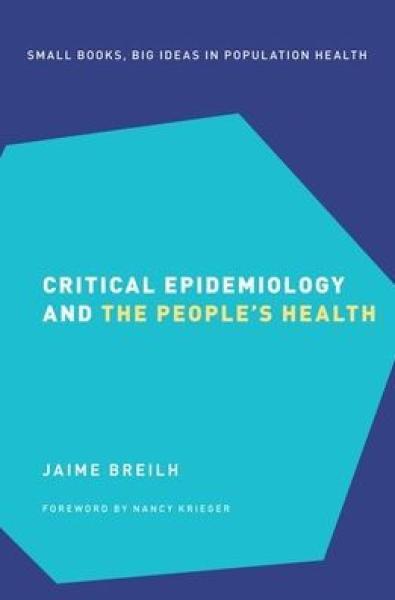Description
The widespread growth of monopolies and big business has led to a fourth industrial revolution focused on producing fast, living fast, and dying fast for the sole benefit of accelerated profit. Despite unprecedented accumulations of wealth and industry, the world has watched as indicators of income
inequality--a partial parameter of social inequity--have increased, while big business, with their nearly unrestricted influence, has increasingly distorted advancements in medical research.
Bold and incisive, Critical Epidemiology and the People's Health invites readers to the next great paradigm in public health by promoting a progressive, transdisciplinary, intercultural, community-building approach radically divergent from the presiding object-based, empiricist mode of thinking. A
concise overview of the Latin American Social Medicine movement, this book introduces the work of leading scientist Jaime Breilh to a global English audience, focusing on key questions such as: What are the real challenges facing critical epidemiology during the current time of immense turmoil and
inequity? How can we conduct responsible and sensitive public health research? What role does epidemiology play in addressing the societal ills of both the global North and South? And how can we create a more rigorous, updated, and effective epidemiology?
In addressing these questions, Critical Epidemiology and the People's Health offers readers a clear-eyed and much-needed perspective on how to overcome Cartesian reductionism with renewed methodological tools to address the rampant growth of injustices harming our global collective health and to
subvert the reigning notions of health prevention and promotion.
"A groundbreaking approach to critical epidemiology for understanding the complexity of the health process and studying the social determination of health. A powerful critique of Cartesian health sciences, of the flaws of "functional health determinants" model, and of reductionist approaches to health statistics, qualitative research and conventional health geography. A consolidated and well sustained essay that explains the role of social-gender-ethnic relations in the reproduction of health inequity, proposing a new paradigm with indispensible concepts and methodological means to develop a new understanding of health as a socially determined and distributed process. It combines the strengths of scientific traditions of the North and South, to bring forward a new understanding and application of qualitative and quantitative (statistical) evidences, that looks beyond the limits of conventional epidemiology, public and population health. The book presents alternative conceptions and tools for constructing deep prevention. A neo-humanist conception of the role of health and life sciences that assumes critical, intercultural and transdisciplinary thinking as a fundamental tool beyond the limiting elitist framework of positivist reasoning. A most important source of fresh ideas and practical instruments for teaching, research and agency, based on a renewed conception of the relation between nature, society, health and environmental problems"--
"This brilliant book is a model of both translation and transformation. It presents decades of research in Latin American critical epidemiology to English-speaking audiences and scholars in other fields and demonstrates that producing emancipatory, path-breaking analysis requires confronting
deeply-entrenched quantitative and qualitative reductionisms." -- Charles L. Briggs, PhD, Distinguished Professor, University of California, Berkeley
"Jaime Breilh is arguably the most creative and influential critical epidemiologist in the world today. Through his brilliant publications, teaching, and public service, he has influenced three generations of scholars and activists with groundbreaking research studies that have challenged the
dominant conceptual and methodological paradigms of public health. Drawing on this research and the tradition of Latin American social medicine, Critical Epidemiology and the People's Health offers an illuminating and inspiring guide for our scientific work and praxis during this transformative
period of our planet's history." -- Howard Waitzkin, MD, PhD, Distinguished Professor Emeritus, University of New Mexico
"Jaime Breilh must be praised for calling attention to culture in disciplinary transformation by underscoring how the contribution of indigenous knowledge and thinking complements academic critical thinking. As we continue to advance our knowledge and methods in epidemiology and public health in
diverse and multicultural contexts, this book offers a timely and much needed intellectual breeze of fresh air for our critical thinking and approaches in addressing and solving population health problems for years to come." -- Luisa N. Borrell, DDS, PhD, Distinguished Professor, Department of
Epidemiology & Biostatistics, City University of New York Graduate School of Public Health & Health Polic
Product Details
- Oxford University Press, Brand
- Jan 22, 2021 Pub Date:
- 0190492783 ISBN-10:
- 9780190492786 ISBN-13:
- 280 Pages
- 7.1 in * 5.1 in * 0.8 in Dimensions:
- 1 lb Weight:




